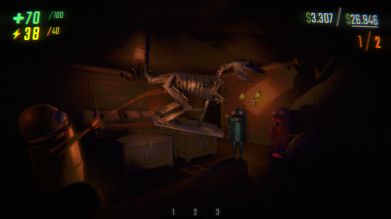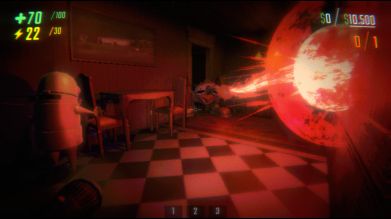My First Encounter with R.E.P.O.
From the moment I launched R.E.P.O., I found myself immersed in an unfamiliar yet inviting world that instantly piqued my curiosity. I remember sitting at my computer, excited yet cautious, as the game began to reveal its layered mysteries. Every pixel seemed meticulously crafted, and the interface beckoned me to explore deeper. I had heard various rumors about the game’s innovative narrative and intricate mechanics, and I was ready to investigate whether these whispers held any merit. That very first impression set the stage for an adventure that would challenge not only my strategic thinking but also my imagination.
Immersive Storytelling and Rich Lore
As I delved into R.E.P.O., the storyline unfolded like a well-written novel. The lore was rich and multifaceted, blending mythic elements with futuristic concepts in seamlessly woven narratives. I soon discovered that the game was not just about completing objectives but about experiencing the evolution of an enigmatic world. Rather than relying solely on flashy cutscenes, the developers provided subtle hints through environmental storytelling, each location telling its own tale. I found myself frequently pausing to absorb the details—a weathered mural here, a cryptic note there—each fragment contributing to the overarching mystery that made the game feel alive.
Engaging Gameplay and Mechanics
The gameplay of R.E.P.O. struck me as both challenging and rewarding. I spent hours mastering its meticulously crafted mechanics, which demanded a blend of thoughtful strategy and real-time decision-making. Every level presented a new type of challenge, forcing me to adapt and experiment with different tactics. I particularly appreciated how the game balanced risk and reward through its system of resource management and dynamic combat strategies. Moving through the levels, I was constantly on my toes, exploring alternative pathways and recalibrating my approach based on the ever-changing circumstances within the game.
Visually Striking Aesthetics and Art Direction
One of the standout features of R.E.P.O. is its distinctive visual style. The game’s art direction is a harmonious blend of realism and imaginative design, imbued with a sense of mystery that captures both the beauty and the dystopian undertones of its environment. I marveled at the attention to detail in the textures and lighting, which seemed intentionally designed to create an atmosphere that was both vibrant and somber. Whether I was traversing sprawling urban landscapes or wandering through eerie, abandoned structures, each setting felt uniquely rendered to evoke a specific emotional response. The striking contrast between shadow and light, along with vivid palette choices, contributed significantly to the immersive experience.
Atmospheric Audio and Sound Design
Complementing the visual artistry was R.E.P.O.s masterful sound design. I found the ambient soundtrack to be a poignant backdrop that moved subtly as I navigated through various challenges. The audio elements were thoughtfully layered, from the soft hum of distant machinery to the rhythmic cadence of footsteps echoing in deserted corridors. In moments of tension, the music shifted seamlessly to heighten my sense of urgency, drawing me further into the game. I also admired how the game utilized environmental sounds to hint at unseen dangers or hidden treasures, making every moment feel meticulously planned and executed.
Intuitive Controls and Responsive User Interface
R.E.P.O. impressed me with its user interface and control system, which felt both intuitive and responsive. Right from the start, the game offered accessible tutorials that guided me gently through its control schemes without overwhelming me with complexity. I appreciated that the interface was clean yet informative, ensuring that I could focus on the intricacies of gameplay without getting lost in the menus. The responsiveness of the controls played a significant role in the overall immersion, allowing me to react quickly to unexpected threats and unpredictable environmental changes—a factor that kept my adrenaline levels high during intense sequences.
Intricate Puzzle Solving and Tactical Challenges
One particularly engaging aspect of R.E.P.O. is its puzzle system. The game manages to blend mental challenges into the fabric of exploration, forcing me to think outside the box. I encountered various puzzles that required not only logical reasoning but also an understanding of the game’s unique mechanics. Solving these puzzles was deeply satisfying, as each solution brought with it the reward of unlocking new areas and unveiling further secrets of the narrative. At times, the puzzles were ingeniously wrapped around the environment, integrating seamlessly into the storyline rather than feeling like isolated minigames. These moments of thoughtful problem-solving added another layer of depth to an already detailed gaming experience.
Dynamic World-Building and Environmental Exploration
As I ventured deeper into R.E.P.O., the dynamic nature of the game world became increasingly evident. Every region within the game was a meticulously designed microcosm that felt both expansive and detailed. I spent countless hours exploring abandoned factories, mysterious warehouses, and hidden underground passages. The environmental storytelling was superb, with each area offering clues to the historical and cultural significance of the setting. I particularly enjoyed the freedom the game provided, allowing me to determine my own path rather than forcing me to adhere to a rigid linear progression. With every exploration, I uncovered new details that reshaped my understanding of the larger narrative, making every discovery feel personal and rewarding.
Rich Character Development and Emotional Engagement
The characters I encountered in R.E.P.O. were anything but one-dimensional. The game introduced me to figures whose histories and motivations were as complex as the world they inhabited. I found myself emotionally invested in their journeys, as their backstories were interwoven with the central narrative in meaningful ways. Whether it was through dialogue exchanges or visual cues, every character carried a subtle weight of their own, adding depth and verisimilitude to the seemingly fantastical environment. Their development was handled with sensitivity, avoiding clichés and instead offering thoughtfully crafted personalities that resonated with me on a personal level.
Engaging Multiplayer Elements and Cooperative Challenges
Beyond the solo journey, R.E.P.O. also features engaging multiplayer elements that opened up a new realm of interactive possibilities. I had the opportunity to collaborate with other players, pooling resources and strategizing in real time to overcome particularly challenging segments. This cooperative mode not only introduced social dynamics into the gameplay but also necessitated a level of tactical coordination that was both challenging and deeply rewarding. Even in these interactions, the game maintained its characteristic emphasis on story and strategy, ensuring that every session felt like a new chapter in an evolving saga. I found that the cooperative challenges required genuine teamwork, reinforcing the game’s commitment to blending narrative depth with interactive play.
Robust Customization and Upgrade Options
Another standout aspect of R.E.P.O. that kept me coming back for more were its extensive customization and upgrade systems. I relished the opportunity to tailor my gameplay experience, whether by upgrading technological abilities, tweaking character skills, or modifying equipment aesthetics. The depth of these systems meant that I was not limited to one style of play; instead, I was encouraged to experiment and adapt based on the challenges at hand. This flexibility proved to be a significant factor in maintaining my engagement, as each new upgrade felt like a step forward in my personal journey through the game. The system was robust and rewarding, allowing for continuous improvements that felt both impactful and immersive.
Performance and Technical Mastery
Throughout my journey in R.E.P.O., I was consistently impressed by the game’s technical performance. Smooth frame rates, quick loading times, and a generally stable platform allowed me to focus on the rich gameplay without being distracted by technical issues. There were moments when the game’s advanced physics engine and detailed environmental simulations truly shone, particularly during complex sequences involving rapid environmental changes. I also appreciated the minimal downtime, which is often a challenge in games of this scale. The developers appear to have dedicated significant resources towards ensuring that the technical side of R.E.P.O. was polished and capable of delivering a consistent, high-quality experience on a range of hardware configurations.
Exploration of Themes and Underlying Messages
One of the most subtle yet intriguing elements of R.E.P.O. was the manner in which it addressed overarching themes and philosophical questions. As I progressed, I found that the game was rich with introspective moments and allegorical references that challenged my preconceived notions. Whether through cryptic dialogue, symbolic environmental design, or cleverly hidden artifacts, the game seemed intent on prompting me to reflect on ideas of progress, sacrifice, and the nature of human resilience. In these instances, I was not merely a passive observer but rather emerged as an active participant in a broader philosophical dialogue, which added a layer of personal and intellectual engagement that is rare in contemporary gaming.
Unpredictability and Replay Value
The experience of playing R.E.P.O. was marked by a remarkable sense of unpredictability. I encountered sequences that deviated from my expectations, encouraging me to reexamine my assumptions about the game world. Elements such as random encounters, variable environmental responses, and unique event triggers contributed to an experience where no two play sessions felt identical. This unpredictability, paired with a deep reservoir of hidden content and alternative outcomes, greatly enhanced the game’s replay value. I found myself revisiting earlier levels with new perspectives, eager to uncover previously hidden details and explore alternative strategies. This dynamic nature transformed R.E.P.O. from a mere game into a living, breathing narrative puzzle that continuously evolved, inviting me to return and experience its new layers with every playthrough.
Interactive World and Player Agency
The sense of agency within R.E.P.O. was particularly noteworthy. Unlike many titles that constrain player actions within a predetermined storyline, this game offered a genuine feeling of influence over the course of events. Every interaction, every decision, seemed to ripple across the game world, altering not just the immediate surroundings but also the long-term evolution of the story. I appreciated that my choices mattered—whether in tactical confrontations, dialogue exchanges, or exploring moral dilemmas deeply embedded in the narrative. This empowerment of the player is something I hold in high regard, as it transforms gameplay into a personalized journey where my unique decisions and actions help shape the unfolding adventure.
Adaptive Difficulty and Strategic Depth
Another remarkable feature that captured my attention was the adaptive difficulty system embedded within R.E.P.O. As I progressed, I noticed that the game intelligently calibrated the challenge according to my performance. At times, intense sequences would ramp up the strategic complexity, demanding not only rapid reaction but also thoughtful planning and resource management. I often found myself revisiting strategies and improvising new approaches, which made every subsequent encounter feel fresh and demanding. This blend of adaptive challenge and strategic depth presented a balanced experience that kept me engaged without feeling overwhelmed. The game’s ability to evolve in real time based on how I approached each challenge was both innovative and deeply satisfying.
Seasonal Events and Community-Driven Content
Beyond the main narrative, R.E.P.O. offers a range of community-driven features and seasonal events that continually refresh the in-game content. I was thrilled to see developers embracing a model that cultivates a strong community spirit among players. These periodic events provided surprises that were relevant to the ongoing storyline and even introduced time-limited challenges that necessitated collaborative problem solving. I participated in several such events and was impressed by the level of detail and care put into these additional layers of content. They not only reinforced the game’s overall themes but also served as a reminder that R.E.P.O. was designed to be a living community hub where both narrative expansion and player interaction are continuously celebrated.
Pros
- Rich and multifaceted lore that enhances the overall experience
- Challenging yet rewarding gameplay mechanics with adaptive difficulty
- Stunning visual aesthetics and art direction that create a unique atmosphere
- Atmospheric audio and layered sound design that heightens immersion
- Dynamic world-building that empowers player agency and choice
- Innovative and immersive narrative that keeps players engaged
Cons
- Occasional technical performance issues on older or less powerful hardware
- Limited accessibility options that might exclude some players from a full experience
- Steep learning curve that may overwhelm beginners


















